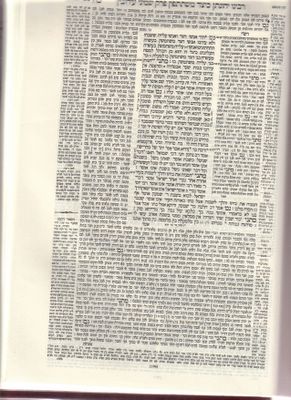
HIDE/SHOW IMAGE
28a
{Eruvin 84a}
The Sages learnt {in a brayta}:
If the tenants of a courtyard and the tenants of the upper story forgot to prepare a joint eruv, the tenants of the courtyard may use the bottom 10 handbreadths and the tenants of the upper story may use the top 10 handbreadths. How so? If a bracket projected from the wall at a lower altitude than 10 handbreadths, the tenants of the courtyard may use us. Higher than 10, the tenants of the upper story may use it.
{Eruvin 85b}
Mishna:
If a person puts his eruv in a gate house, portico, or gallery, it is not an eruv, and the person who dwells there does not restrict him. In a straw shed, in a cattle shed, in a woodshed, or in a storehouse, then this is an eruv, and the person who dwells there restricts him.
Rabbi Yehuda says: If the householder has the rights of possession there, he {=the tenant} does not restrict him. {=the householder. Rather the tenant is considered one of the member of the household.}
Rav Yehuda cited Rav {our gemara: Shmuel}: If the members of a group were dining and the sactity of the {Shabbat} day overtook them {=night fell}, they may rely upon the bread on the table for an eruv.
And some say {=another version}: for a shittuf.
Rava said: There is really no difference between them {=these two versions}. Here, they were dining in a house, and here they were dining in the courtyard.
For they learnt {in a brayta}: Eruvs of courtyards should be deposited in a house in the courtyard and shitufs of alleyways should be deposited in a courtyard in the alleyway.
"Rabbi Yehuda says: If the householder has the rights of possession there...":
Rights of possession, how so? Such as the courtyard of Ben Ninam.
To explain: Ben Ninam was a wealthy man and in each house in his courtyard he had {stored} goods and items.
{Eruvin 86a}
And Rabba bar Chiyya {our gemara: bar bar Chana} said: Even the pin of a plow {which he stores there}.
Rav Nachman said: Those of the house of Shmuel taught: That {which the owner stores} which may be handled on Shabbat, the tenant imposes restrictions, but that which may not be handled on Shabbat, the tenant does not impose restrictions.
Mishna:
If a person left his house and went to spend the Shabbat in another town, whether he is a non-Jew or an Israelite, he restricts. These are the words of Rabbi Meir.
Rabbi Yehuda says: he does not restrict.
Rabbi Yossi says: A non-Jew restricts, an Israeli does not restrict for it is not the custom of an Israelite to come on the Shabbat.
Rabbi Shimon says: Even if he left his house and went to spend the Shabbat with his daughter in the same town, he does not restrict, because he had already dismissed it from his mind.
Gemara:
Rav said: The halacha is like Rabbi Shimon.
And specifically to his daughter, but to his son, no, for as people say: If a male dog barks at you, go in, but if a female dog barks at you, go out. {The worry is that the daughter-in-law will fight with her father-in-law and he will have to leave.}
Mishna:
If there is a cistern between two courtyards, one may not draw from it on Shabbat unless they made for it a partition of ten handbreadths high, whether above, whether below {the water}, whether within its basin {but its top does not hit the surface}.
It's been a while...
-
I've been blogging a bit on Substack, at Scribal Error. While focused more
on gemara and girsaot, I just had a post on Rationalism and Midrash. Check
ou...
3 years ago



No comments:
Post a Comment